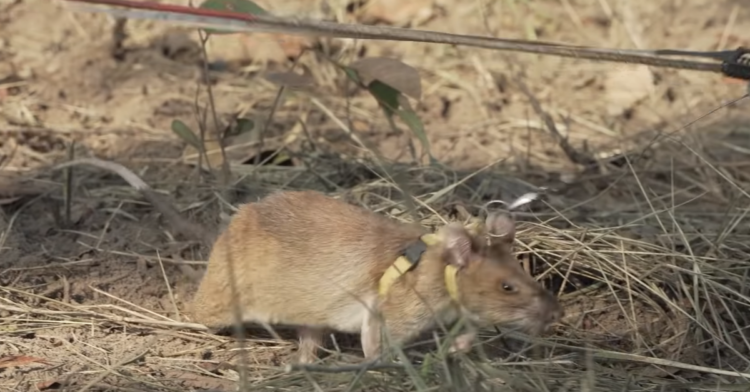Although humans have spent decades and in some cases centuries relying on the support of trained animals, we can still be surprised by the capabilities some of these animals had all along.
For instance, the use of dogs to detect explosives and narcotics is a well-known practice by this point, as is the use of rats in laboratory settings.
However, recent years have made it clear that rats are apparently just as adept at finding dangerous explosives and there are a lot of reasons why they might be even better suited to the job.
This impressive skill has been exemplified by the career of one award-winning rat that is apparently coming to an end.
Decades after the last ones would have been planted, there are an estimated six million landmines buried throughout Cambodia.

And according to the BBC , these mines are just as serious a threat as ever since about 64,000 people have fallen victim to them since 1979 and 25,000 people had to receive amputations as a result of contact.
But while locating these mines remains a massively time-consuming and dangerous undertaking for humans, that’s apparently less true for rats.

According to the BBC, rats can be trained to sniff out a chemical compound within mines, which means they can tell the difference between a genuine explosive and a rogue piece of scrap metal.
It is for that reason that back in the 1990s, a Belgian charity named Apopo started raising rats — known as HeroRATS — for this purpose in Tanzania.
But even by the standards of rats bred to detect explosives, seven-year-old Magawa was particularly good at it.

As The Guardian reported, he was able to clear out the equivalent on 20 football fields (1.5 million square feet) over the course of five years. In that time, he’s detected 71 landmines and 38 other explosives in Cambodia.
According to the BBC, his weight of 2.6 pounds makes him light enough to walk over mines without detonating them. As a result of his sniffing capabilities and his weight, he can clear a field that would normally take humans one to four days to pore over in 20 minutes.
Magawa’s outstanding performance earned him a gold medal from the British veterinary charity PDSA for his “lifesaving devotion to duty” in September of 2020.

According to The Guardian , this is the charity’s top civilian award for animal bravery and until Magawa received his award, it had only been given to dogs.
But while Magawa has done outstanding work in Cambodia, it was all but inevitable that it would come to an end now as rats are only expected to live up to eight years.
And so, a representative from Apopo announced on June 5 that Magawa will now enter retirement.
As they said, “Although still in good health, he has reached a retirement age and is clearly starting to slow down. It is time.”
We can certainly say that he’s earned his rest!
h/t: BBC , The Guardian

















































